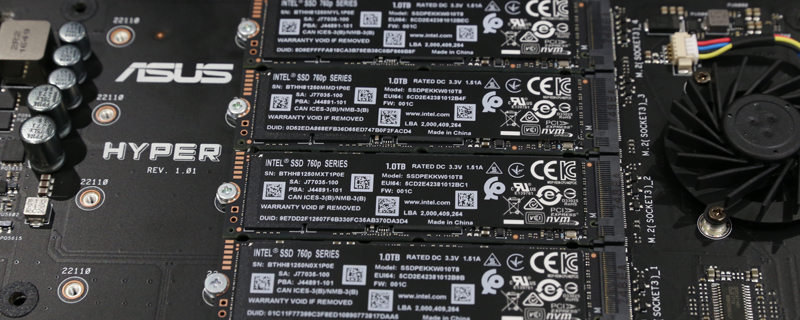4x Intel 760P 1TB M.2 NVMe RAID0 Review OverKILL3D
Conclusion
The transition to 64-layer NAND has really revolutionised the possibilities of the M.2 NVMe storage without absolutely crippling your bank account. It wasn’t that long ago that you’d have to make a serious decision about whether you could live with a single kidney if you were planning on buying a 1TB SSD, yet here we are with a drive which clocks in around the £350 mark for the 1TB model.
With the price of the ASUS Hyper M.2 x16 taken into account today’s setup costs approximately £1500. That is for 4TB of RAID0 storage that can push out some hilariously gaudy numbers at the high end. With a big enough block size we broke through the 10000 MB/s barrier, and in fact in our ATTO test we got read numbers so high that it started giving us exponents instead of the raw number.
It all boils down to the fact that Intel’s move from 32-layer 3D NAND to 64 layer 3D NAND has had a dramatic effect on the entry price to their latest 760P M.2 drives, whilst not negatively impacting performance in a manner that you might expect from something which promises so much storage capacity but for a price that is eminently affordable for anyone looking to make the step up from either a regular 2.5″ SSD or even, god forbid, a mechanical drive. Although we think if you went from the sluggishness of a mechanical HDD straight to the responsiveness of an M.2 NVMe drive your head might explode.
It isn’t all good news though, at least not when looking at our particular setup. Smaller block sizes don’t seem to scale at all, so the endless tiny file writes that your operating system makes every minute of the day wont see a particular benefit from utilising this many drives in parallel. Similarly if you expected to use the Intel 760P drives as the basis for a multi-user setup in a small business or similar, the amount of Input/Output Operations Per Second (IOPS) it can handle doesn’t match up to some of the truly fast offerings around such as the Samsung 960 Pro, still far and away the Daddy on the block. Lastly to get such gaudy numbers we’re running in RAID0. It doesn’t take a genius to work out that committing so many resources to a drive that will be rendered useless at even the smallest physical error is hardly wisdom personified. RAID0 has no error redundancy built in, and if you went to a version of RAID that did, you wouldn’t get the attention-grabbing transfer rates.
However, for a home user that won’t be thrashing the drive queue with hundreds of SQL requests, and who understands the dangers of running RAID0 even in these modern times when it’s significantly more reliable than it ever has been, then the Intel 760P 1TB M.2 NVMe drives provide the fastest storage solution you could hope to find at a price which doesn’t require the sale of your firstborn child, and wins our OC3D Performance Award.
Discuss the Intel 760P 1TB M.2 NVMe in our OC3D Forums.




